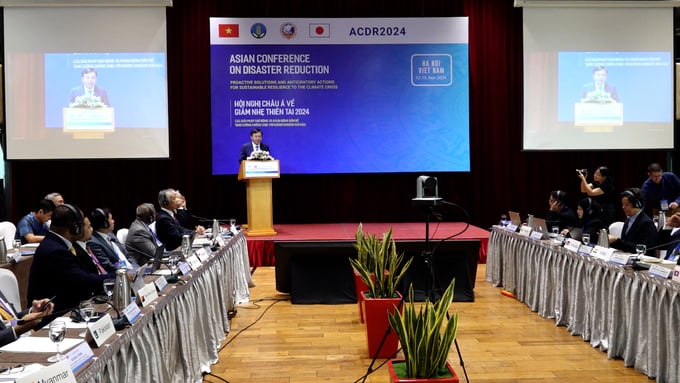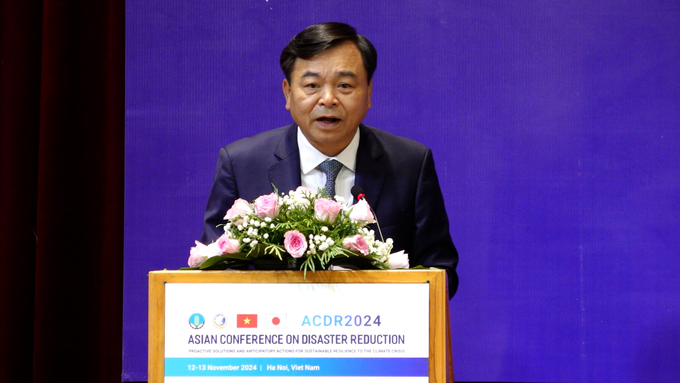May 24, 2025 | 16:20 GMT +7
May 24, 2025 | 16:20 GMT +7
Hotline: 0913.378.918
May 24, 2025 | 16:20 GMT +7
Hotline: 0913.378.918

2024 Asian Conference on Disaster Reduction (ACDR2024) in Hanoi. Photo: Linh Linh.
The Asian Disaster Reduction Center (ADRC) and the Department of Dyke Management and Natural Disaster Prevention (DDMNP) jointly hosted the 2024 Asian Conference on Disaster Reduction (ACDR2024) in Hanoi on November 12-13.
ACDR2024 will prioritize innovative strategies, including digital transformation in disaster risk reduction, to facilitate the implementation of the Sustainable Development Goals and the Sendai Framework for Disaster Risk Reduction.
The objective of ACDR2024 is to evaluate the advancements made in the improvement of disaster risk management systems by exchanging disaster experiences from landlocked regions, lessons from recent major disasters in member countries, and new initiatives and approaches from member nations and partner organizations to prepare for complex and overlapping disasters.
The frequency and intensity of climate-related disasters are on the rise, not only in Asian countries but also globally, as per the World Meteorological Organization. These natural events are expected to cause extensive damage to life and property, impacting both developing regions and areas with more developed infrastructure.
At the Conference, Deputy Minister of Agriculture and Rural Development Nguyen Hoang Hiep underscored the necessity for countries to not only fortify their internal resources but also to unite, share experiences, and provide support to one another in order to respond more resolutely to the increasing number of climate-related disasters that result in substantial loss of life and property.
"As a country with a history of facing numerous natural disasters, we agree on the current principles of disaster prevention and risk reduction, such as enhancing understanding of climate-related risks, promoting digital transformation, boosting resilience after crises, strengthening community resilience with priority for vulnerable areas, and improving disaster prevention infrastructure to address climate risks, especially with an emphasis on forecasting and early warning systems, and technology transfer through pilot models," according to Deputy Minister Nguyen Hoang Hiep.
Mr. Nukina Koji, Assistant Minister for Disaster Management at the Cabinet Office of the Japanese Government, stated that the importance of implementing preventive measures to ensure national resilience, providing disaster risk information to citizens, improving living conditions during evacuations, and initiating reconstruction efforts has increased as extreme natural disasters become more frequent. He joined the online discussion. He proposed that countries could promote innovative solutions to mitigate disaster risks by sharing advanced technologies and scientific knowledge.

Deputy Minister of Agriculture and Rural Development Nguyen Hoang Hiep delivering a speech at the Conference. Photo: Quang Dung.
The two-day conference will feature a roundtable discussion with representatives from ADRC member countries, who will share their progress and challenges in post-disaster recovery. They will also debate methods to improve cooperation in order to expedite the implementation of the Sendai Framework for Disaster Reduction 2015-2030..
Furthermore, a technical session featuring local and international experts will address proactive solutions, including the collection, management, and utilization of risk information to facilitate accurate analysis and forecasting, as well as the early implementation of measures to reduce the effects of disasters such as flash floods and flooding.
The final session will concentrate on Vietnam's current disaster management, including the categories of disasters, existing frameworks, preparedness, response strategies, challenges, and future orientations. In addition, the session will emphasize Vietnam's successful disaster preparedness and risk reduction initiatives.
Ms. Doan Thi Tuyet Nga, Head of International Cooperation and Science and Technology at the Department of Dyke Management and Natural Disaster Prevention, explained to the press that ADRC conducts an annual conference to enable member countries to exchange experiences and establish future cooperation directions. In 2024, Vietnam will be the host, illustrating its dedication to the development of disaster response capabilities and the promotion of regional cooperation in catastrophe risk reduction.
In recent years, Vietnam has experienced substantial economic losses as a result of natural disasters, which have resulted in a 1-1.5% decrease in GDP. In the economically significant provinces of Quang Ninh and Hai Phong, Typhoon Yagi most recently caused significant damage to infrastructure, utilities, and telecommunications, significantly impacting the lives and livelihoods of the local population. This situation is not exclusive to Vietnam; other countries in the region also encounter comparable obstacles.
During the sessions, countries collaborate to advance directions that are consistent with shared trends and to learn from practical experiences, in addition to exchanging information. To establish more appropriate disaster recovery and prevention activities, they also endeavor to secure initiatives and priorities from significant financial funds, such as climate change funds.
"We believe that three key factors are essential in protecting communities and mitigating disaster risks and damages: building sustainable infrastructure, raising public awareness, and improving information systems," said Doan Thi Tuyet Nga.
Translated by Dieu Linh

(VAN) In the tranquil wetlands of Van Long, there are quiet souls who guard the forests, nurture the waters, and oversee every bird and troop of langurs as protecting the essence of a living heritage.

(VAN) WWF, GIZ, IUCN, UNDP call for biodiversity conservation and sustainable development must be regarded as a unity in strategies for a green future.

(VAN) On celebration of International Day for Biological Diversity, Deputy Minister Nguyen Quoc Tri called for practical actions to address nature and biodiversity conservation.

(VAN) Dr. Hoang Thi Thanh Nhan – Deputy Director of the Nature and Biodiversity Conservation Agency – highlighted this on the International Day for Biological Diversity, May 22, 2025.
![Ho Chi Minh city adapts to climate change: [2] Accelerating action](https://t.ex-cdn.com/nongnghiepmoitruong.vn/608w/files/chiqk/2025/05/22/4024-4220-bien-doi-khi-hau-1-100626_766.jpg)
(VAN) Clearly recognizing the challenges posed by climate change, Ho Chi Minh city has swiftly shaped its policies and implemented practical solutions to adapt.

(VAN) Rice straw is no longer just a discarded byproduct, but it is becoming a green resource that helps farmers in the Mekong Delta reduce emissions and promote circular, sustainable agriculture.

(VAN) Other Effective Area-based Conservation Measures (OECMs) are solutions that contribute effectively to achieving the goals of the Kunming–Montreal Global Biodiversity Framework.